
Living with irritable bowel syndrome (IBS) often means facing daily challenges that go beyond occasional stomach pain or bowel irregularities. For many, irritable bowel syndrome fatigue adds a layer of difficulty, impacting overall quality of life and limiting daily activities. Persistent fatigue in IBS patients causes debilitating exhaustion that can worsen other symptoms of IBS, like abdominal pain, bloating, and altered bowel habits.
At Nudge, we understand the complexities of IBS and the additional strain of irritable bowel syndrome fatigue. We've developed an all-natural, comprehensive supplement explicitly designed to target the root causes of small intestinal bacterial overgrowth (SIBO)—a common trigger of IBS. We've combined the most effective elements from various treatments into one powerful, prescription-free solution to support your digestive system and enhance your lifestyle.
Drawing from our extensive scientific research, we've crafted this guide to explore the intricacies of irritable bowel syndrome fatigue and its common causes. We'll also explore alleviating IBS fatigue and how to incorporate lifestyle changes, like a low FODMAP diet and regular exercise. By the end of this blog, you'll have a clearer understanding of managing IBS fatigue effectively, leveraging our specialized supplement and practical, everyday lifestyle habits.
Let's jump in!
What is Irritable Bowel Syndrome Fatigue?
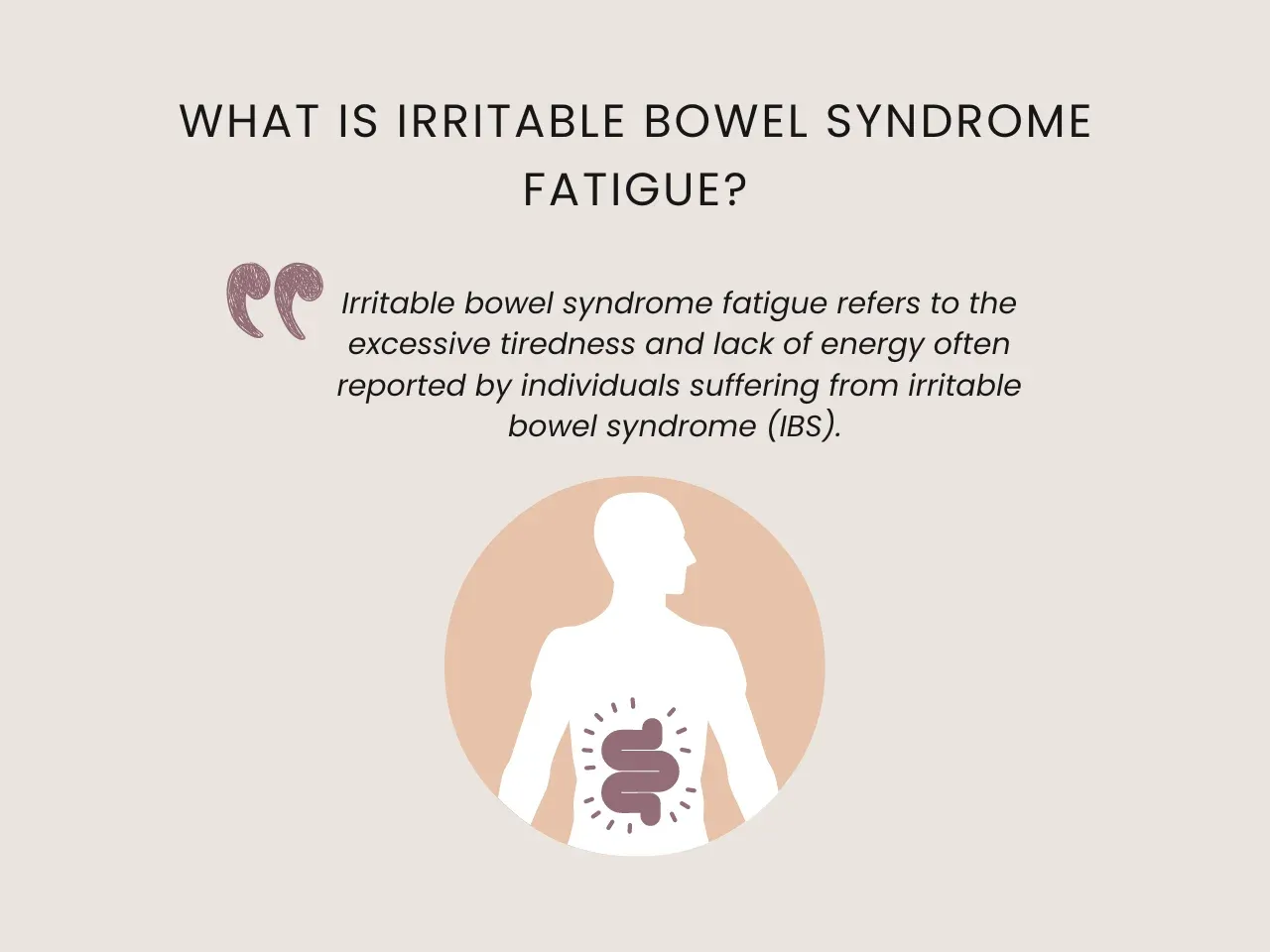
Irritable bowel syndrome fatigue refers to the excessive tiredness and lack of energy often reported by individuals suffering from irritable bowel syndrome (IBS). This type of fatigue can significantly impact daily activities, as it is not just about feeling sleepy but constantly drained.
Common Symptoms of Irritable Bowel Syndrome Fatigue
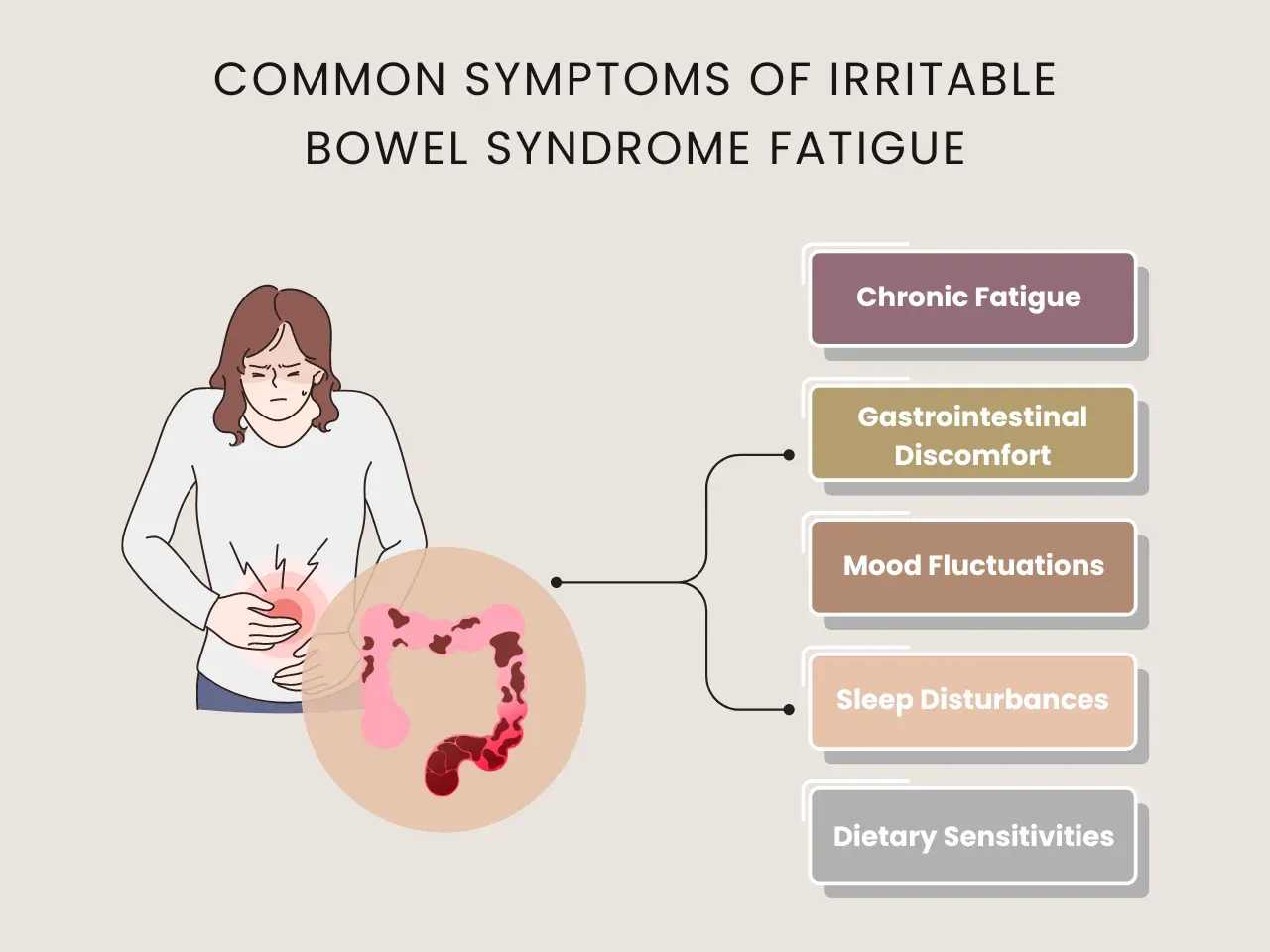
- Chronic Fatigue: Beyond normal tiredness, irritable bowel syndrome patients often experience profound exhaustion that doesn't improve with rest, closely mirroring symptoms of chronic fatigue syndrome.
- Gastrointestinal Discomfort: Symptoms of irritable bowel syndrome, such as recurrent abdominal pain, constipation, and diarrhea, can disrupt sleep and exacerbate fatigue. The effort to manage these symptoms can also lead to increased tiredness.
- Mood Fluctuations: The strain of managing IBS can lead to chronic stress and mood changes, which are closely linked to increased fatigue. Managing stress levels through methods like yoga can help mitigate these effects.
- Sleep Disturbances: Many with IBS experience interruptions in their sleep patterns due to abdominal cramps and urgent bowel movements. Not getting enough sleep directly contributes to daytime fatigue.
- Dietary Sensitivities: Food intolerances, particularly dairy and gluten, can trigger IBS flare-ups, leading to increased symptoms and fatigue. Making dietary changes to avoid trigger foods is crucial for managing this condition.
Understanding irritable bowel syndrome fatigue is essential for those managing IBS symptoms. Effective treatment options include maintaining a balanced diet, ensuring regular digestive tract health with probiotics, and following a treatment plan that may include medication and lifestyle adjustments.
9 Causes of Irritable Bowel Syndrome Fatigue
Irritable bowel syndrome (IBS) often leads to a crippling type of exhaustion known as irritable bowel syndrome fatigue. This fatigue can profoundly affect daily activities and overall quality of life. Here, we explore the top 9 common causes of this condition, providing insights into how IBS impacts energy levels.
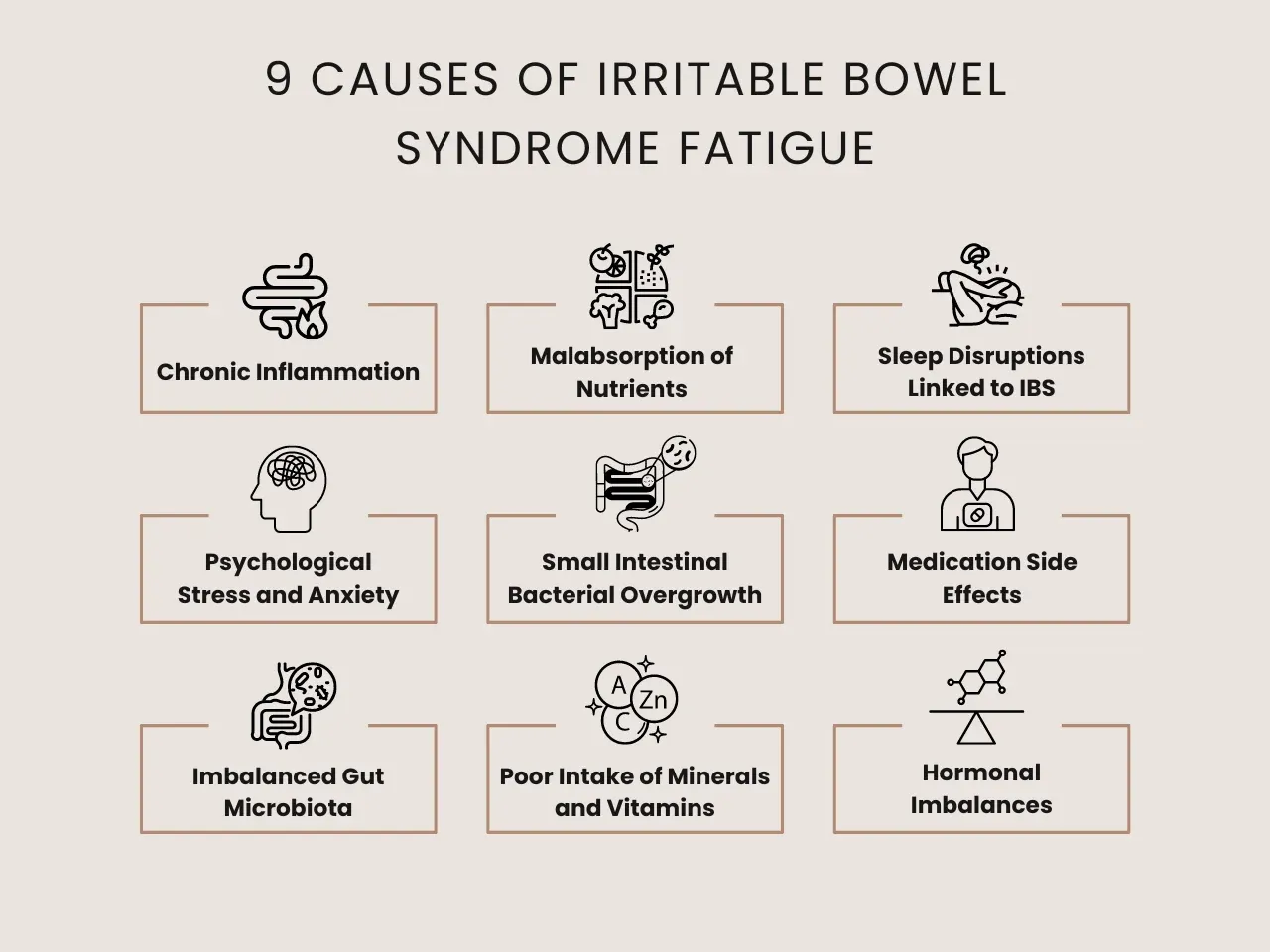
Cause 1: Chronic Inflammation
Chronic inflammation plays a key role in irritable bowel syndrome (IBS) fatigue. It can prolong discomfort and worsen symptoms. Inflammation in the gut can disrupt normal functions, leading to chronic fatigue, which IBS patients often experience. This persistent state affects physical health and emotional and mental well-being.
Research indicates chronic inflammation linked to IBS involves a complex interplay of immune responses. A study published in the Journal of Inflammation Research highlights the presence of increased immune cells within the gut lining of IBS patients. These cells, particularly mast cells, release chemicals that can trigger pain and fatigue, illustrating a direct connection between inflammation and IBS symptoms.
This relationship is crucial for developing targeted treatments that address the root causes and the symptoms of IBS fatigue.
Cause 2: Malabsorption of Nutrients
Fatigue in irritable bowel syndrome is caused by the body’s inability to absorb necessary nutrients. Digestive system inefficiency can result in fatigue, weakness, and other associated medical conditions. Malabsorption among people with IBS might occur due to abnormal movements of the intestine that disrupt gut function or make it overly sensitive, thus affecting the body's processing and utilization of nutrients.
The relationship between nutrient malabsorption and IBS is complex and influenced by several factors, including dietary choices. For instance, people with IBS might experience exacerbated symptoms when consuming foods high in fermentable carbohydrates such as lactose or fructose. This can lead to a greater response in these individuals compared to those without IBS, compounding their discomfort and contributing to nutrient deficiencies.
Proper diet management, tailored to each individual's specific needs and reactions, is crucial in mitigating the effects of malabsorption and improving overall digestive health and energy levels.
Cause 3: Sleep Disruptions Linked to IBS
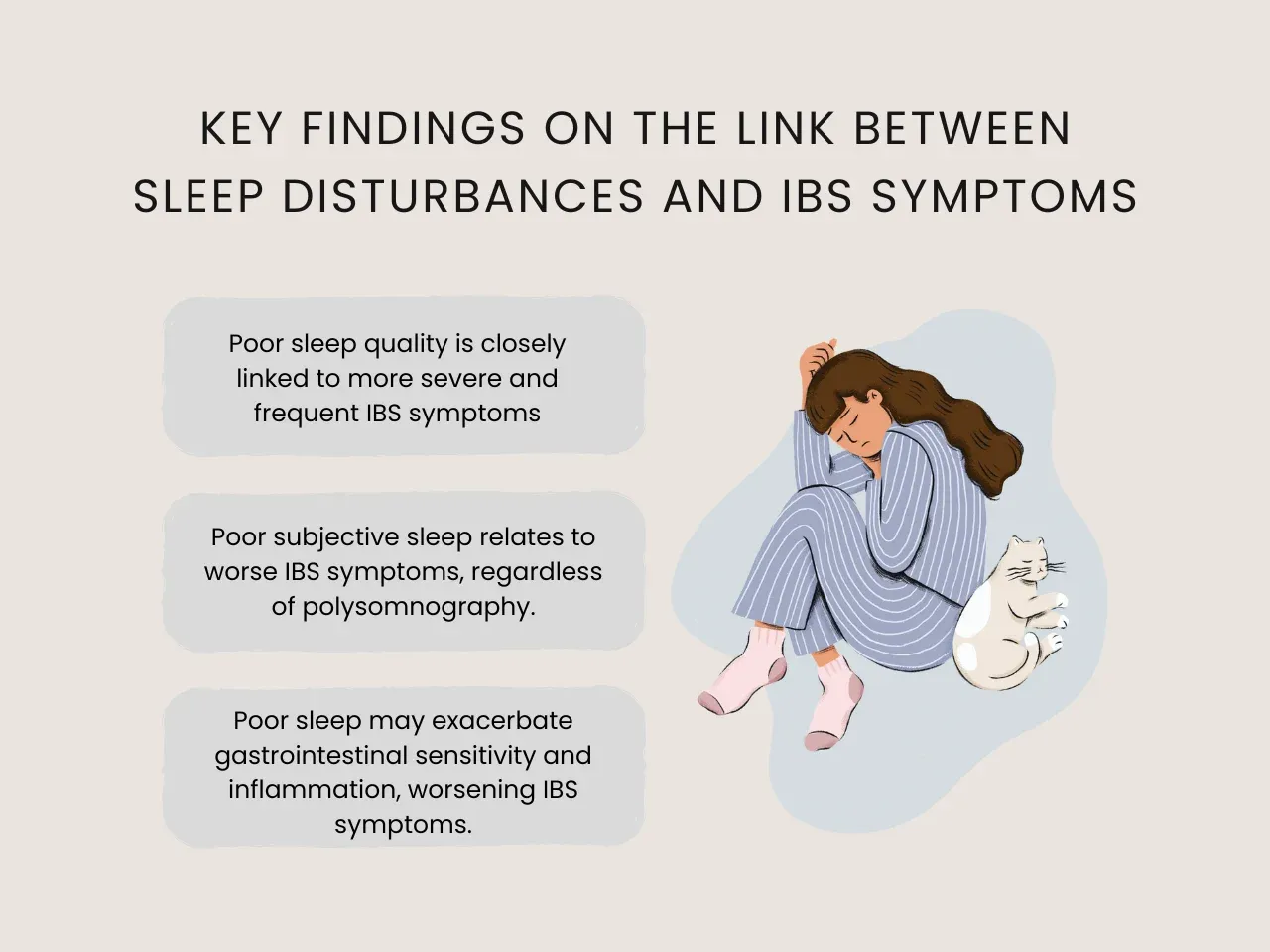
Sleep disturbances are a major concern for irritable bowel syndrome (IBS) patients and result in impaired quality of life. IBS sufferers often have trouble getting to sleep, staying asleep, and getting restorative rest, and that has been documented in numerous studies. This can further disturb their sleep, leading to not only worse fatigue the next day but also more pronounced digestive symptoms, complicating IBS management.
The relationship between sleep disturbances and IBS is well-documented. A systematic review published in Neurogastroenterology and Motility in 2017 highlights several key findings:
- A clear association exists between poorer subjective sleep quality and the severity and frequency of IBS symptoms.
- Despite inconsistent findings from objective measures like polysomnography, the subjective experience of poor sleep correlates strongly with worse symptom reports in IBS patients.
- This disruption in sleep patterns is thought to enhance gastrointestinal sensitivity and inflammation, further triggering IBS symptoms.
Understanding this link is crucial for treating IBS effectively. Comprehensive approaches addressing gastrointestinal health and sleep quality are needed to improve patient outcomes.
Cause 4: Psychological Stress and Anxiety
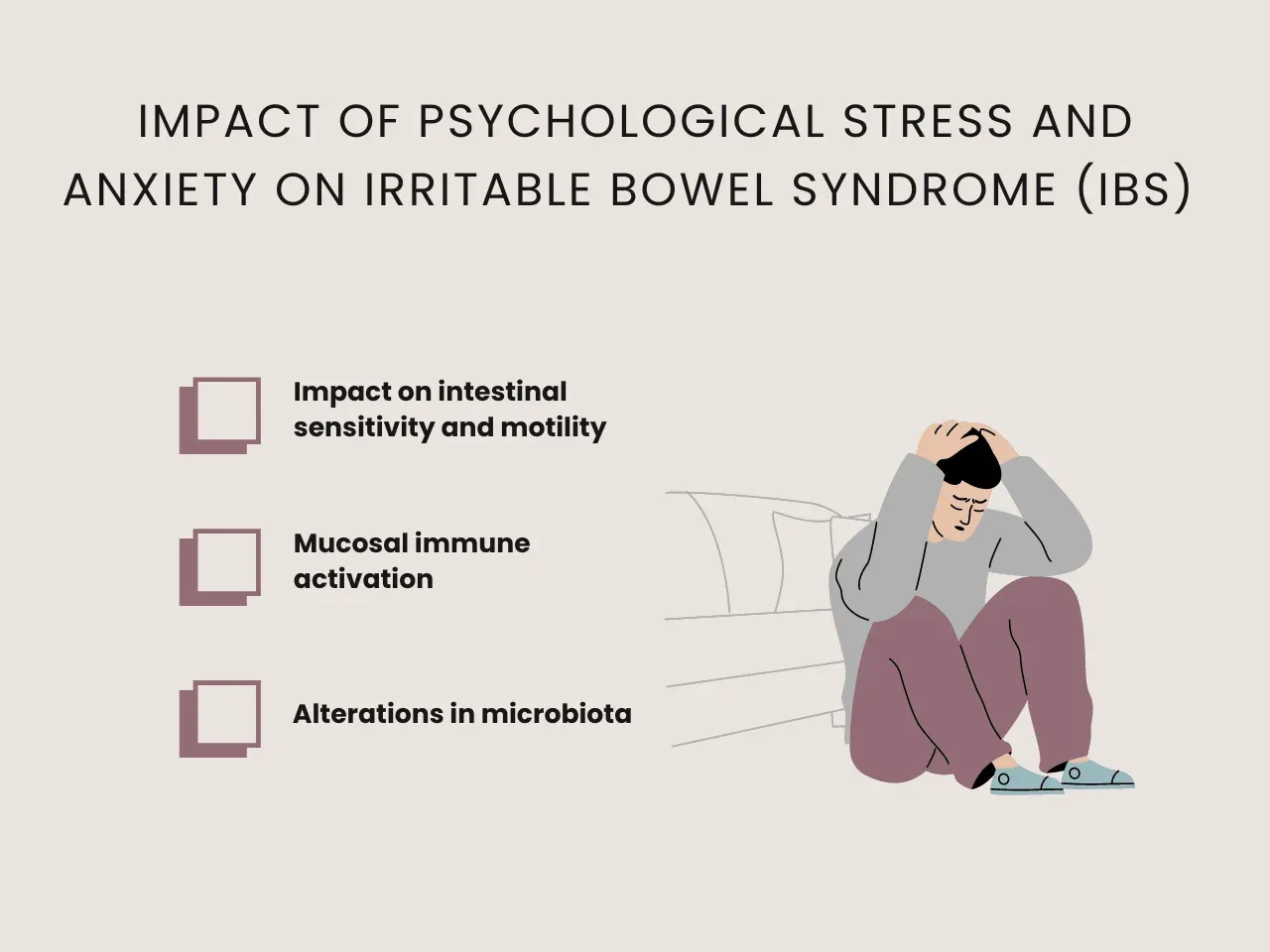
Psychological stress significantly impacts the development and exacerbation of irritable bowel syndrome (IBS), mainly contributing to IBS fatigue. Stress influences various bodily functions through the brain-gut axis, affecting gut motility, sensitivity, and overall gastrointestinal health. This interaction between psychological states and physical symptoms underscores the complex nature of IBS.
Clinical and experimental studies provide insights into how stress impacts IBS. According to a review published in the World Journal of Gastroenterology, psychological stresses alter intestinal functions by affecting mucosal immune response and altering gut microbiota, thereby exacerbating symptoms of IBS. Key findings include:
- Impact on Intestinal Sensitivity and Motility: Stress can increase intestinal permeability and motility, leading to more pronounced IBS symptoms.
- Mucosal Immune Activation: Psychological stress activates mucosal immune responses, aggravating gastrointestinal disturbances.
- Alterations in Microbiota: Stress alters the composition and function of gut microbiota, further influencing IBS symptoms.
These mechanisms illustrate the significant role of psychological stress in triggering and intensifying irritable bowel syndrome fatigue, highlighting the importance of managing stress to alleviate IBS symptoms.
Cause 5: Small Intestinal Bacterial Overgrowth (SIBO)
Small Intestinal Bacterial Overgrowth, also known as SIBO, occurs when too many bacteria are in a gut, causing problems with normal digestion. This overgrowth is often characterized by symptoms like bloating, diarrhea (or watery stools), abdominal pain or discomfort, and malabsorption of nutrients. Significantly, SIBO is associated with irritable bowel syndrome (IBS), particularly in types like IBS-C, where it contributes to persistent irritations.
A study by Takakura and Pimentel in 2020 highlights the prevalence and impact of SIBO in IBS patients, including:
- SIBO can be identified by a hydrogen lactulose or glucose breath test; increased hydrogen production indicates bacterial overgrowth.
- The presence of specific pathogenic bacteria such as Enterococcus and Escherichia coli is common in SIBO-afflicted individuals.
- Symptoms overlap between SIBO and IBS, including fatigue—often referred to as irritable bowel syndrome fatigue.
Nudge's health supplement explicitly targets these issues. It includes prokinetics for SIBO and other key ingredients designed to regulate and reduce bacterial overgrowth, thus addressing one of the root causes of SIBO and its related fatigue. This targeted approach helps alleviate the comprehensive symptom complex of IBS.
Cause 6: Medication Side Effects
Medications often prescribed for irritable bowel syndrome (IBS) can sometimes lead to fatigue. This type of fatigue, known as medication side effects, stems from the body's reaction to specific treatments to alleviate IBS symptoms. Common medications include antispasmodics and antidepressants, which can cause drowsiness or decreased energy levels as side effects.
Drugs can help ease discomfort and pain in the gut. However, they may affect the body’s natural energy levels. People with IBS must talk about the possible side effects of these medications with their doctor. Changing the dose or trying other therapies that do not cause tiredness so much can help maintain a better balance between controlling signs of IBS and having enough strength.
Cause 7: Imbalanced Gut Microbiota
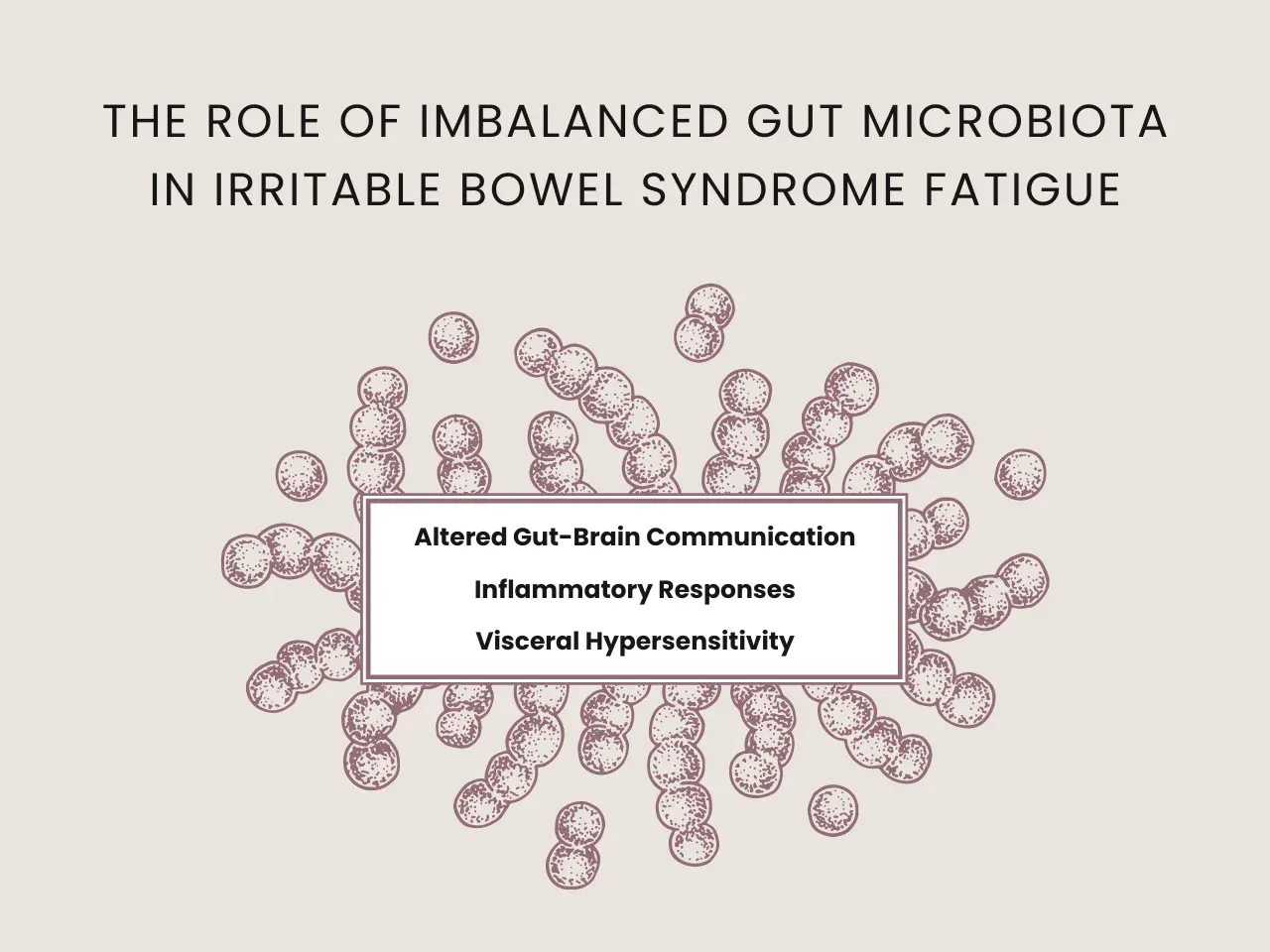
Human health relies on gut microbiota, which influences digestion, immunity, and mental state. A healthy microbiota promotes good digestion and nutrient absorption. It safeguards against pathogens and adjusts immune reactions. When an imbalance, known as dysbiosis, affects these roles, it may lead to different conditions, such as irritable bowel syndrome (IBS).
Research shows that an imbalanced gut microbiota is a significant factor in the development of IBS, which can manifest as irritable bowel syndrome fatigue. This condition results from the complex interactions between the gut flora and the body's immune responses.
A study published in the Journal of Clinical Medicine in April 2023 highlights several mechanisms through which dysbiosis contributes to IBS:
- Altered Gut-Brain Communication: The study emphasizes the brain-gut axis, where an imbalanced microbiota can affect neurotransmission and hormone production, leading to symptoms of fatigue and discomfort.
- Inflammatory Responses: Dysbiosis often triggers inflammatory responses that can exacerbate gastrointestinal symptoms and contribute to the sensation of fatigue.
- Visceral Hypersensitivity: This condition, where individuals experience abnormal pain sensitivity in the gut, is linked to microbiota imbalances, leading to chronic pain and fatigue.
These mechanisms underscore the importance of maintaining a balanced gut microbiota to effectively manage or prevent irritable bowel syndrome fatigue.
Cause 8: Poor Intake of Minerals and Vitamins
Balanced mineral and vitamin intake is fundamental to proper health, yet this is often compromised in IBS patients, contributing to irritable bowel syndrome fatigue. Nutritional deficiencies may exacerbate the gastrointestinal symptoms of IBS and lead to systemic symptoms such as fatigue.
This is illustrated in a study published in the Journal of Gastroenterology and Hepatology by Roth, Larsson, and Ohlsson in 2022. The study shows that in IBS patients, this relationship is potentially dangerous, with poor micronutrient intake significantly associated with an escalating symptom burden.
The research highlighted several key findings:
- IBS patients frequently consume less than the recommended levels of key nutrients, including iron, vitamin B6, and magnesium.
- There is an inverse relationship between the intake of these nutrients, plasma levels, and the severity of gastrointestinal and extraintestinal symptoms.
- Implementing a starch- and sucrose-reduced diet (SSRD) improves nutrient intake and correspondingly decreases symptoms.
The relationship between IBS and poor micronutrient intake emphasizes the importance of dietary management in IBS, suggesting that addressing micronutrient inadequacies can mitigate symptoms like irritable bowel syndrome fatigue.
Cause 9: Hormonal Imbalances
IBS fatigue can happen due to hormone changes. Women deal with IBS more than men because of shifts in estrogen and progesterone. Studies show women are twice as likely to have IBS. Low levels of these hormones can slow digestion and cause constipation, a main IBS issue. Hormone dips also make pain worse, making IBS discomfort harder to handle.
A study highlighted that about 40% of women with IBS reported worsened symptoms during their menstrual cycle. Hormone levels rise and fall throughout the cycle, directly impacting IBS. During the late luteal phase, symptoms like bloating and constipation intensify when hormone levels drop.
Similarly, menopause brings another shift in hormone levels, with mixed effects on IBS. While some women experience relief, others report increased symptoms. Understanding the link between hormonal changes and IBS can help in managing the condition more effectively.
How to Manage and Alleviate IBS Fatigue
Managing and alleviating fatigue associated with irritable bowel syndrome (IBS) can be challenging. However, with some lifestyle adjustments and targeted strategies, it's possible to improve your energy levels. Here are five considerations to help you manage and alleviate IBS fatigue:
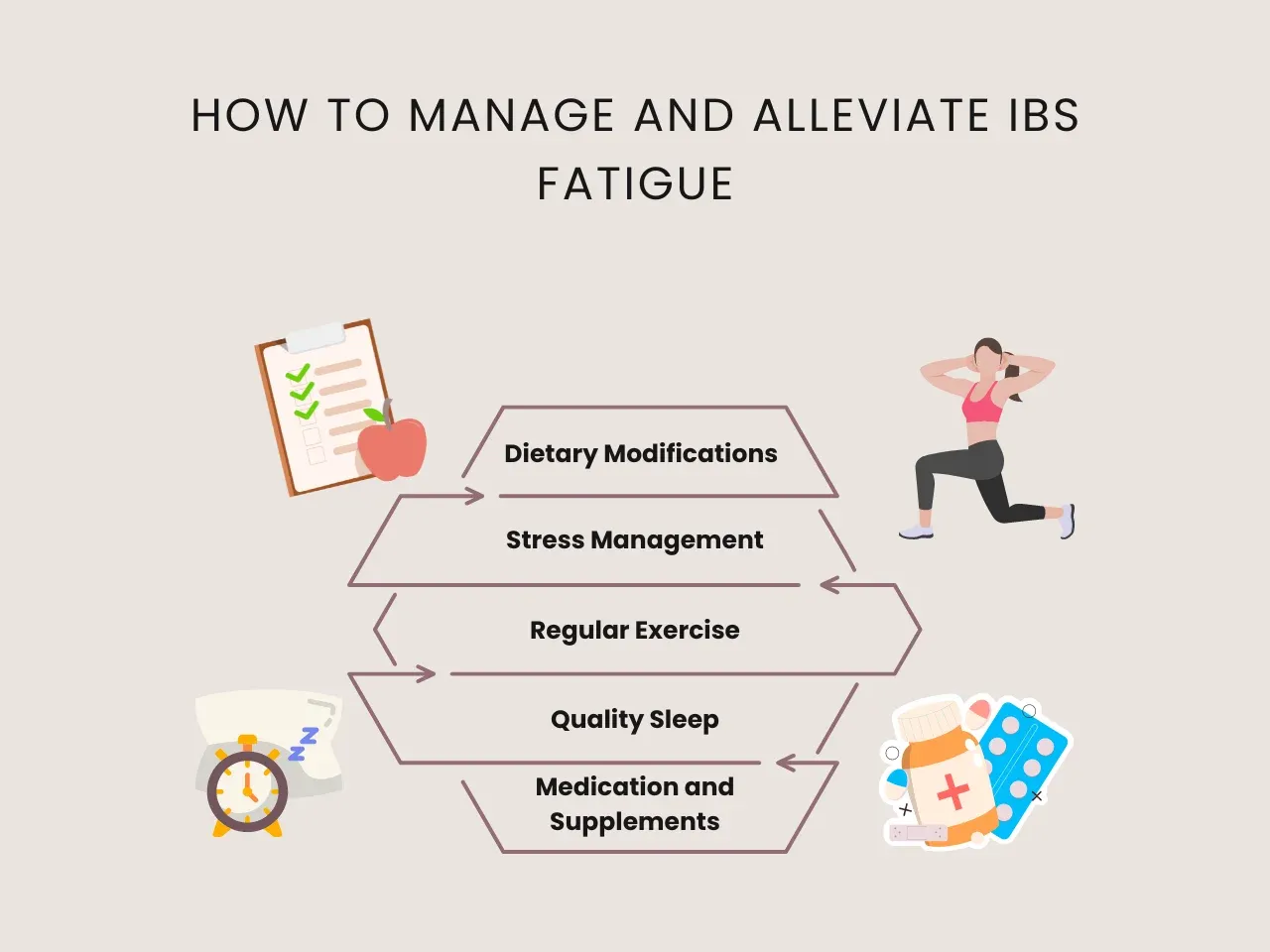
Dietary Modifications
Modifying your diet plays a crucial role in managing IBS fatigue. Focus on foods that support digestion and reduce inflammation. Limiting dairy products and caffeine can prevent the aggravation of IBS symptoms. Plenty of water and nutrition-rich foods help maintain a balanced gut bacteria environment. Avoid foods that trigger inflammation in the colon, as the body cannot digest and trigger inflammation in the colon, causing fatigue and discomfort.
Stress Management
Stress directly affects the nervous system and impacts the gastrointestinal tract. Techniques like mindfulness, yoga, and cognitive-behavioral therapy can significantly lower stress levels. Managing stress effectively helps reduce the abnormal contractions in the intestine that often accompany IBS.
Regular Exercise
Exercise promotes healthy contractions in the colon and helps regulate bowel movements. Walking, cycling, and swimming can enhance your overall digestive health and reduce IBS symptoms, including fatigue. Regular exercise also helps expel toxins through sweat, aiding digestion and reducing inflammation.
Quality Sleep
Improving sleep quality can alleviate IBS fatigue. IBS often disrupts sleep due to abdominal pain and discomfort. Establishing a regular sleep schedule, optimizing your bedroom environment, and avoiding stimulating activities, such as screen time and consuming caffeine, before bedtime can improve sleep quality and help manage IBS fatigue.
Medication and Supplements
For some individuals, medications may be necessary to manage specific IBS symptoms. Blood and stool tests can help diagnose conditions like parasitic infections that may exacerbate IBS symptoms. SIBO supplements, particularly those targeting gut health, can be beneficial. Nudge’s SIBO supplement targets the root causes of SIBO, a condition linked to IBS fatigue. Its ingredients improve gut motility and support the microbiome, which is vital for reducing symptoms of IBS.
Key Takeaway
Irritable bowel syndrome fatigue significantly impacts daily life, often leaving individuals feeling constantly drained and unable to maintain normal activities. Managing this fatigue involves a combination of dietary adjustments and lifestyle changes. Consuming a balanced diet, staying hydrated, and incorporating moderate exercise can help alleviate irritable bowel syndrome symptoms.
Understanding the triggers of irritable bowel syndrome fatigue is vital. Take an IBS quiz to identify your specific symptoms and their dietary links. Knowledge about your condition empowers you to make informed decisions, leading to improved health. This proactive approach minimizes fatigue and boosts your energy.
Do you wonder how supplements can help manage your irritable bowel syndrome fatigue? Nudge offers tailored support to combat the root causes of IBS fatigue. With our guidance, you can reclaim your vitality and enjoy a more active lifestyle. Check out Nudge today—we’ll guide you every step of the way.